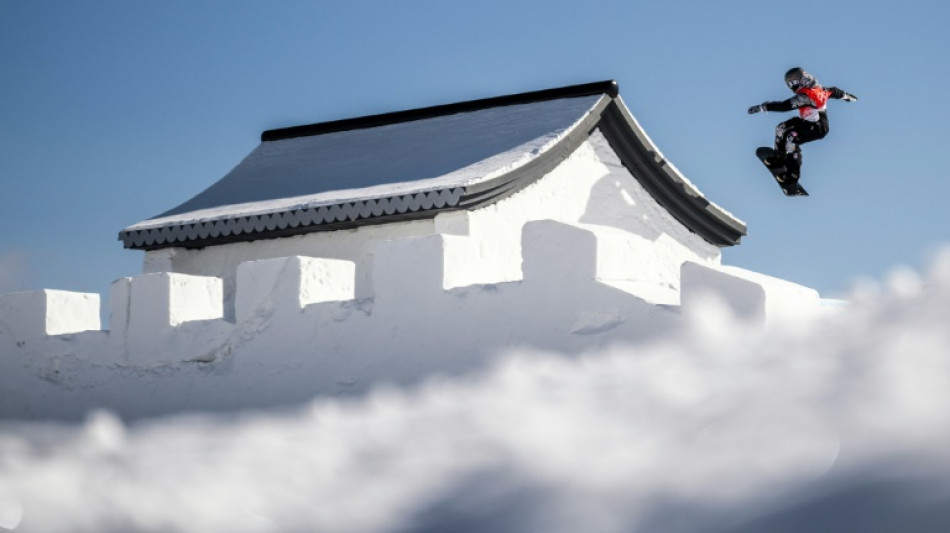
-
 Czech qualifier Bejlek claims first title in Abu Dhabi
Czech qualifier Bejlek claims first title in Abu Dhabi
-
French duo reach Shanghai, completing year-and-a-half walk

-
 Australian snowboarder James eyes elusive Olympic gold
Australian snowboarder James eyes elusive Olympic gold
-
Sequins and snow: Eva Adamczykova makes Olympic return

-
 Vonn set for Olympic medal bid after successful downhill training
Vonn set for Olympic medal bid after successful downhill training
-
Shepherd takes hat-trick as West Indies beat Scotland in T20 World Cup

-
 Sausages will sell after thrill-seeker Von Allmen wins Olympic downhill
Sausages will sell after thrill-seeker Von Allmen wins Olympic downhill
-
Swiss racer Von Allmen wins first gold of Winter Olympics

-
 'Wake up': Mum sparks comeback after scare for freeski star Gu
'Wake up': Mum sparks comeback after scare for freeski star Gu
-
Von Allmen wins men's Olympic downhill gold, first of Games

-
 First medals up for grabs at Winter Olympics
First medals up for grabs at Winter Olympics
-
Afghanistan captain Khan harbours dream of playing in Kabul

-
 Lindsey Vonn completes second Winter Olympics downhill training run
Lindsey Vonn completes second Winter Olympics downhill training run
-
Freeski star Gu survives major scare in Olympic slopestyle

-
 Iran FM looks to more nuclear talks, but warns US
Iran FM looks to more nuclear talks, but warns US
-
Hetmyer's six-hitting steers West Indies to 182-5 against Scotland

-
 After boos for Vance, IOC says it hopes for 'fair play'
After boos for Vance, IOC says it hopes for 'fair play'
-
Thousands gather as Pakistan buries victims of mosque suicide attack

-
 Lindsey Vonn completes second downhill training session
Lindsey Vonn completes second downhill training session
-
US pressing Ukraine and Russia to end war by June, Zelensky says

-
 Faheem blitz sees Pakistan avoid Netherlands shock at T20 World Cup
Faheem blitz sees Pakistan avoid Netherlands shock at T20 World Cup
-
Takaichi talks tough on immigration on eve of vote

-
 England's Salt passed fit for T20 World Cup opener
England's Salt passed fit for T20 World Cup opener
-
Spain, Portugal brace for fresh storm after flood deaths

-
 Pakistan bowl out Netherlands for 147 in T20 World Cup opener
Pakistan bowl out Netherlands for 147 in T20 World Cup opener
-
Pushed to margins, women vanish from Bangladesh's political arena

-
 Crypto firm accidentally sends $40 bn in bitcoin to users
Crypto firm accidentally sends $40 bn in bitcoin to users
-
Pistons end Knicks' NBA winning streak, Celtics edge Heat

-
 Funerals for victims of suicide blast at Islamabad mosque that killed at least 31
Funerals for victims of suicide blast at Islamabad mosque that killed at least 31
-
A tale of two villages: Cambodians lament Thailand's border gains

-
 Police identify suspect in disappearance of Australian boy
Police identify suspect in disappearance of Australian boy
-
Cuba adopts urgent measures to address energy crisis: minister

-
 Not-so-American football: the Super Bowl's overseas stars
Not-so-American football: the Super Bowl's overseas stars
-
Trump says US talks with Iran 'very good,' more negotiations expected

-
 Trump administration re-approves twice-banned pesticide
Trump administration re-approves twice-banned pesticide
-
Hisatsune leads Matsuyama at Phoenix Open as Scheffler makes cut

-
 Beyond the QBs: 5 Super Bowl players to watch
Beyond the QBs: 5 Super Bowl players to watch
-
Grass v artificial turf: Super Bowl players speak out

-
 Police warn Sydney protesters ahead of Israeli president's visit
Police warn Sydney protesters ahead of Israeli president's visit
-
Simi Khanna Launches Simi Beauty SK: A Natural Skincare Line Blending Luxury, Wellness, and Purpose

-
 Best Gold IRA Companies February 2026 Announced (Top Gold-backed IRA Companies Revealed)
Best Gold IRA Companies February 2026 Announced (Top Gold-backed IRA Companies Revealed)
-
Bolivia wants closer US ties, without alienating China: minister

-
 Ex-MLB outfielder Puig guilty in federal sports betting case
Ex-MLB outfielder Puig guilty in federal sports betting case
-
Milan-Cortina Winter Olympics open with dazzling ceremony

-
 China overturns death sentence for Canadian in drug case
China overturns death sentence for Canadian in drug case
-
Trump reinstates commercial fishing in protected Atlantic waters

-
 Man Utd can't rush manager choice: Carrick
Man Utd can't rush manager choice: Carrick
-
Leeds boost survival bid with win over relegation rivals Forest

-
 Stars, Clydesdales and an AI beef jostle for Super Bowl ad glory
Stars, Clydesdales and an AI beef jostle for Super Bowl ad glory
-
Dow surges above 50,000 for first time as US stocks regain mojo


Weather at Beijing Olympics should be better than Pyeongchang
Those competing in this month's Beijing Winter Olympics will face frosty temperatures but should be spared the Siberian winds and chill factor that sparked postponements and athlete anger during the last Games in South Korea.
Pyeongchang 2018 was bedevilled by sweeping high winds of up to 80 kilometres (50 miles) an hour which forced delays to alpine skiing and snowboarding events.
Multiple snowboarders were injured after accidents caused by sudden gusts in both practice and competition, triggering anger that the events were allowed to go ahead in such conditions.
While Northern China's winters are harsh and unforgiving, as a region it has something Pyeongchang did not -- fairly predictable and fixed weather patterns.
"Thus far, the weather forecast looks cold, but stable," Jenny Wiedeke, a spokesperson for the International Ski Federation, told AFP.
The blustery conditions that made Pyeongchang so risky for snowboarders should be less of an issue -- wind speeds so far this month have been recorded at a maximum of around 35 kilometres an hour.
"The wind is expected to be weak or potentially moderate," said Yann Amice, a meteorologist and former consultant for the French Winter Olympic teams.
Wiedeke said Olympic organisers will also have plans in place to mitigate against a sudden flurry of high winds.
"If it is a windy day for an Alpine downhill, the start might be lowered to a less windy altitude. In ski jumping, some hills have wind nets installed if they are in a wind location to act as a barrier," she said.
- Cold and constant -
Daytime temperatures in the mountains outside Beijing where the main skiing and snowboarding events will take place regularly dip below -16 Celsius (three Fahrenheit).
The cold could become a problem if the mercury plunges below -20C -- the point where an event like cross country can be postponed.
Recent night temperatures in Zhangjiakou have been recorded as low as -25C.
Previous Games in Russia's low-lying Sochi and Canada's Vancouver saw an opposite meteorological problem -- warm temperatures creating slushy conditions or shortages of snow.
Amice says that should not be an issue at Yanqing, where the alpine sports are taking place, or at Zhangjiakou which will host cross-country skiing, the biathlon, snowboarding, freestyle skiing and ski jumping.
"As the site is geographically landlocked, we don't expect any major upheavals... The cold temperatures will remain a constant," he told AFP.
"We are a long way from the very changeable conditions of Vancouver or Sochi where we had monstrous high to low changes in temperatures."
- 'Bulletproof ice' -
One meteorological phenomenon usually associated with the Winter Olympics that is unlikely at the Beijing Games is days in a row of heavy snow dumps.
Beijing's surroundings are incredibly dry, meaning snowfall is a rarity even with temperatures reliably well below freezing.
As a result virtually all the snow on the slopes for this year's Games has been made artificially, with thousands of gallons of water used.
Earlier this week twice defending snowboard slopestyle champion Jamie Anderson described the artificial snow at Zhangjiakou as being densely packed.
"It's not quite ideal, but I would say we're all making the most of it," she said. "You definitely don't want to fall. It feels like pretty bulletproof ice."
D.Sawyer--AMWN



